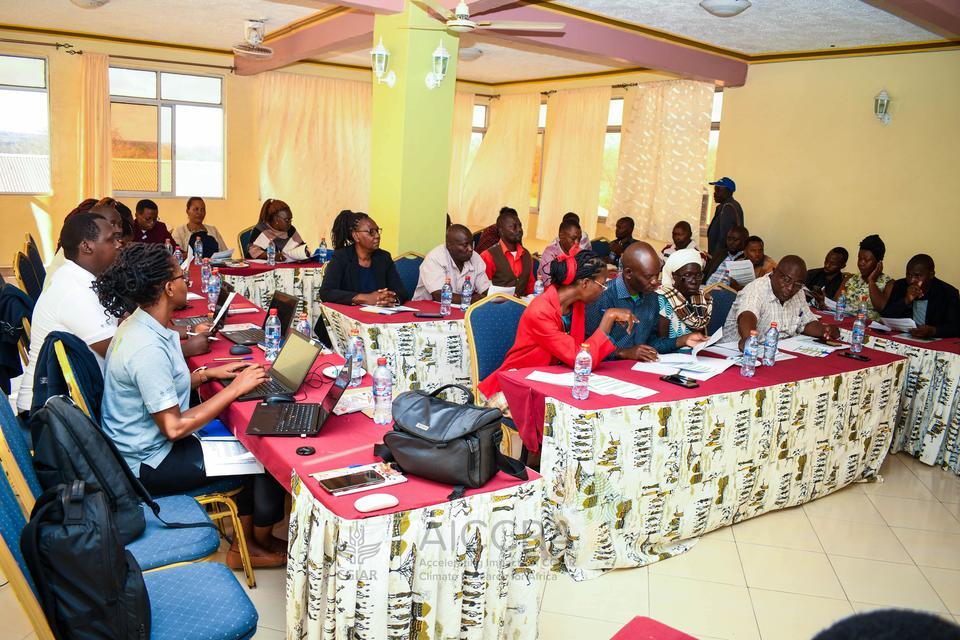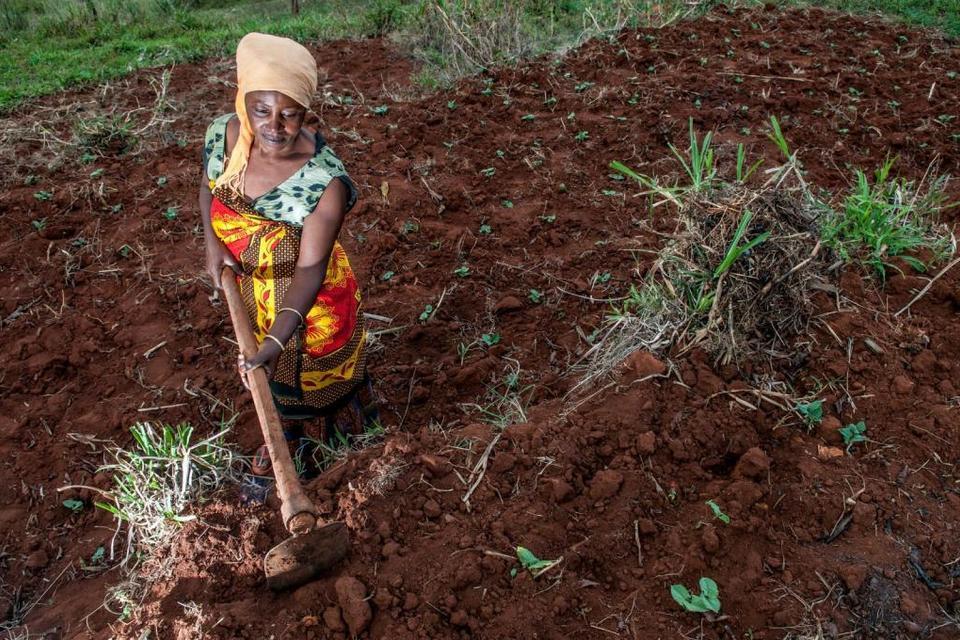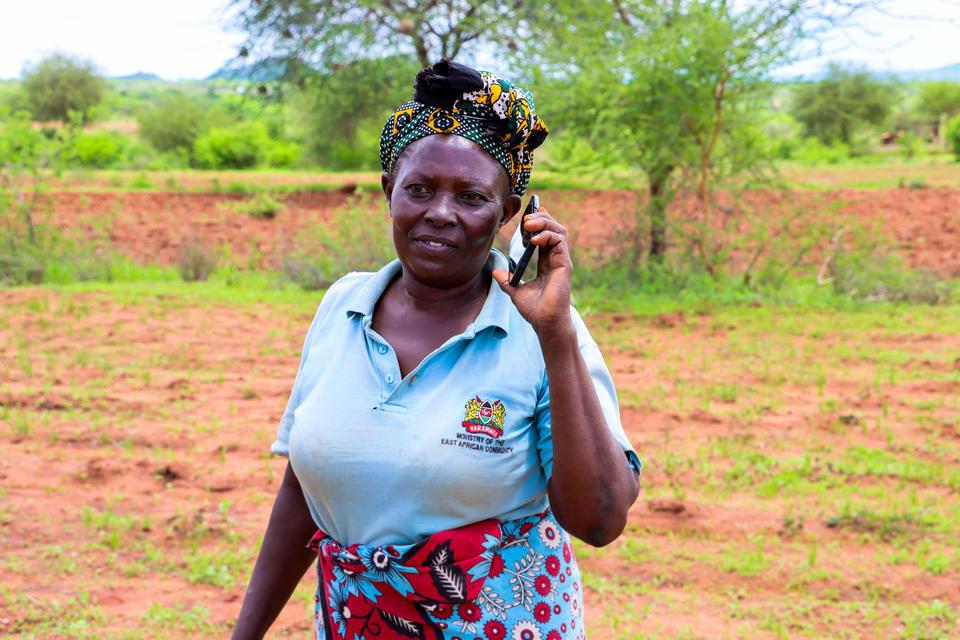Blog Empowering East African Farmers with Weather and Climate Information Services: ECREA's Climate-Smart Strategies for Resilient Agriculture in the Bean Value Chain
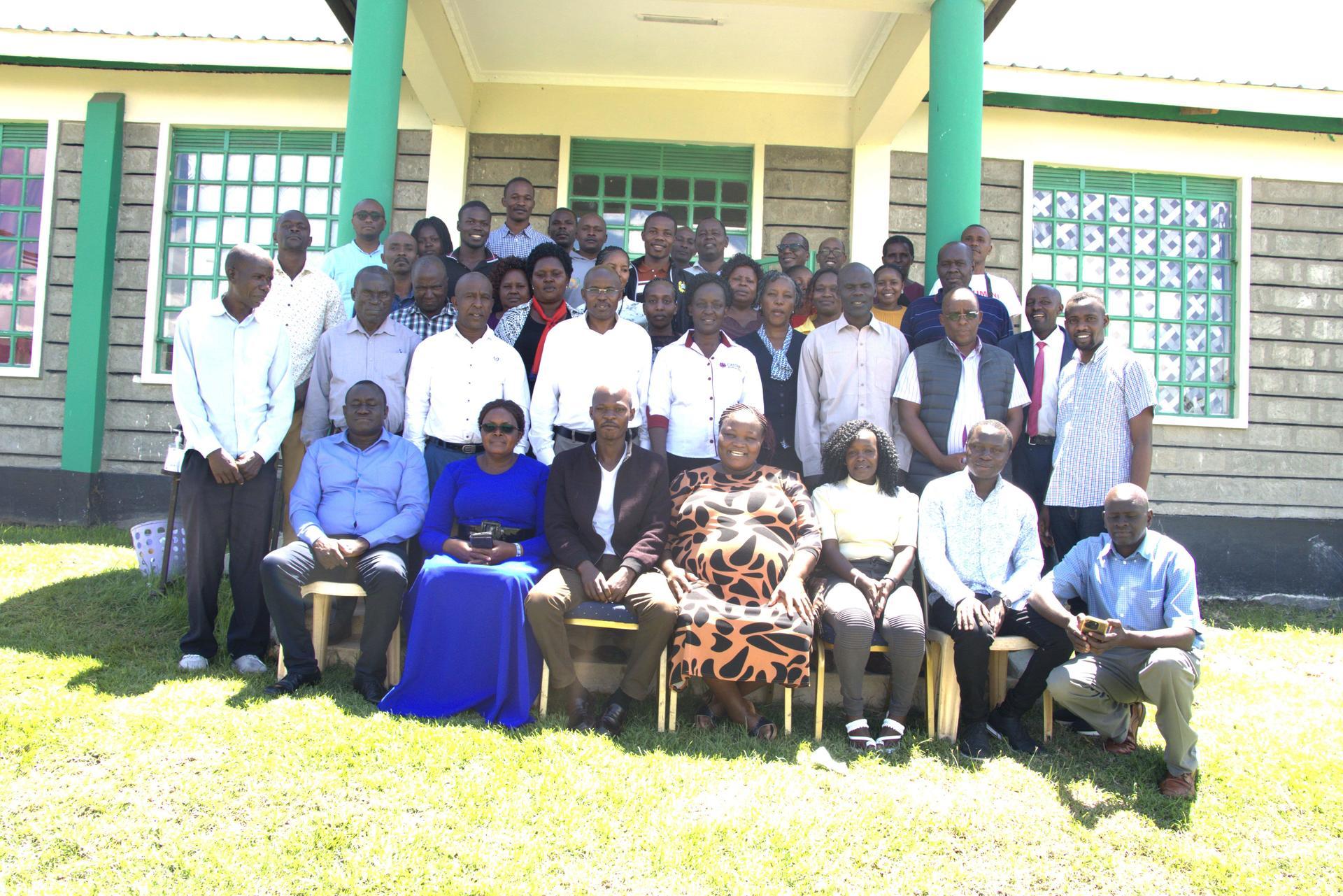
In the face of escalating climate crisis and its profound impact on small-scale agricultural producers in Sub-Saharan Africa (SSA), initiatives such as the Enhancing Climate Change Resilience in East Africa (ECREA) project emerge as beacons of hope. The ECREA project is spearheaded by the Climate Action lever of the Alliance of Bioversity International and CIAT through the Pan-Africa Bean Research Alliance (PABRA), with the goal of upscaling the provision of Weather and Climate Information Services (WCIS) to bean value chain actors in East Africa. ECREA - funded by the UK Government's Foreign, Commonwealth and Development Office (FCDO) - is a concerted effort to address the pressing challenges exacerbated by shifting weather patterns.
By: Joseline Kiogora and Desire Kagabo
Contributions from: Livingstone Byandaga, Patrick Mvuyibwami and Chris Ngige
The project responds to the urgent need for co-designed Weather and Climate Information Services (WCIS), recognizing their pivotal role in enabling farmers to anticipate and manage extreme events, optimize favorable conditions, and adapt to the ever-evolving climate landscape. However, amidst these efforts, there exists a critical gap in inclusivity, particularly concerning the engagement of women and youth, who are disproportionately affected by climate vulnerabilities.
The project is focusing on four East African countries—Kenya, Rwanda, Tanzania, and Uganda. It sets out to bridge this gap by strengthening both the supply and demand sides of the WCIS equation. With a keen emphasis on partnership and collaboration, the project leverages the expertise of National Agricultural Research Systems (NARS), National Meteorological and Hydrological Services (NMHS) and strategic alliances with organizations like: IGAD Climate Prediction Applications Center (ICPAC), Shamba Shapeup and iShamba and community radios such as Radio Huguka in Rwanda and FADECO Radion in Tanzania to foster inclusive and accessible climate resilience strategies.
At the heart of the ECREA project lies the recognition of the pivotal role played by the common bean (phaseolus vulgaris l.) in African households. Beans have evolved from a traditional subsistence crop to a staple and market-oriented commodity, becoming instrumental in enhancing food security, balancing gender roles, and increasing income generation across the region. As such, bean production serves as a primary testing ground for the project's interventions.
Central to the project’s approach is co-production, which prioritizes inclusive partnerships with women, youth, and marginalized groups to ensure that WCIS are diverse, accessible, and responsive to the needs of all stakeholders.
Through a multi-faceted strategy encompassing capacity building, institutional strengthening, and knowledge-sharing, the project aims to empower smallholder farmers to navigate the complexities of climate change with confidence and resilience. This project is not merely about disseminating information, but rather about fostering a culture of resilience, collaboration, and empowerment that transcends borders and generations.
It is against this backdrop that, in the heart of Nakuru, a dedicated team recently met for a transformative training known as the PICSA Master Class, specifically tailored for actors in the bean value chain. The training was led by Kenya Agricultural and Livestock Research Organization (KALRO) in collaboration with the Alliance's ECREA project. The training employed a cascading approach, starting from Master Classes to the Training of Trainers, ultimately empowering lead farmers to disseminate knowledge on WCIS and other agro-climatic advisory services to their peers in bean production hubs. But what exactly is PICSA, and why is it capturing the attention of farmers across the region?
PICSA, or Participatory Integrated Climate Services for Agriculture, is a game-changer for farmers. It's about giving them the tools they need to make informed decisions based on accurate climate and weather information, locally relevant options for crop and livestock species, and using participatory tools for decision making.
At the training - held from the 29th of April-3rd May at the Agricultural Training Centre in Nakuru - extension officers and lead farmers from four counties in Kenya learned about the 12 steps of the PICSA approach. Each step is designed to help farmers harness a range of information, from climate and weather to crop and livestock data, to plan and make decisions that are right for their farms.
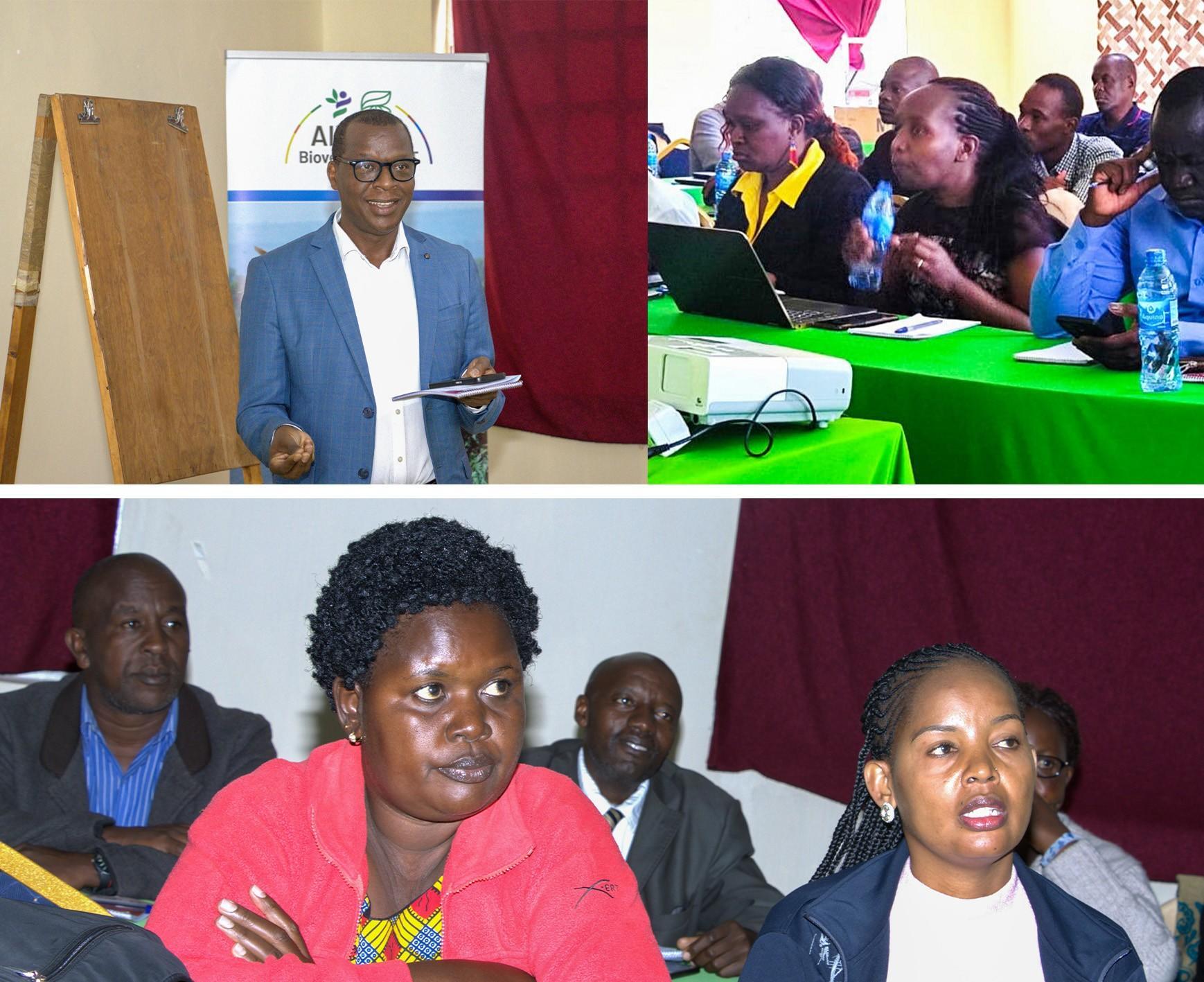
Participants actively contributing insightful perspectives at the PISCA training in Nakuru, Kenya. Photo credit: Joseline Kiogora/Alliance of Bioversity International and CIAT
Long before the season begins, participants learned how to assess what farmers are currently doing and understand historical climate data and farmers' perceptions of climate change. They also learned how to identify probabilities and risks and explore the various options available to farmers based on their unique contexts. Farmers were taught how to access, understand and use seasonal forecasts to adjust their farming plans which they had made long before the season using historic climate information.
Participants also delved into comparing different options and creating participatory budgets, empowering farmers to choose the best course of action for their farms. Ahead of the season, they learned how to interpret seasonal forecasts and identify possible responses.
During the season, participants were equipped to respond to short-term forecasts and warnings, ensuring that farmers can adapt quickly to changing weather conditions and minimize risks to their crops and livelihoods.
The training had a strong impact, with 100 farmers and extension officers trained and the potential to reach 100,000 in Kenya. This cascade effect anticipates trained individuals to share knowledge within their communities, empowering others and enhancing resilience against climate change. Specifically designed for face-to-face engagement with 100,000 farmers, the training ensures personalized and impactful interactions, equipping them with essential knowledge and skills.
However, what truly highlighted the importance of this training was the enthusiastic support from the county governments of Machakos, Homabay, Nakuru and Elgeyo Marakwet. The official opening of the workshop was graced by the Honorable Leonard Bor, the County Executive Committee Member of Nakuru County and his Elgeyo Marakwet counterpart Edwin Seroney, reaffirming the county's dedication to empowering farmers through innovative approaches such as PICSA.
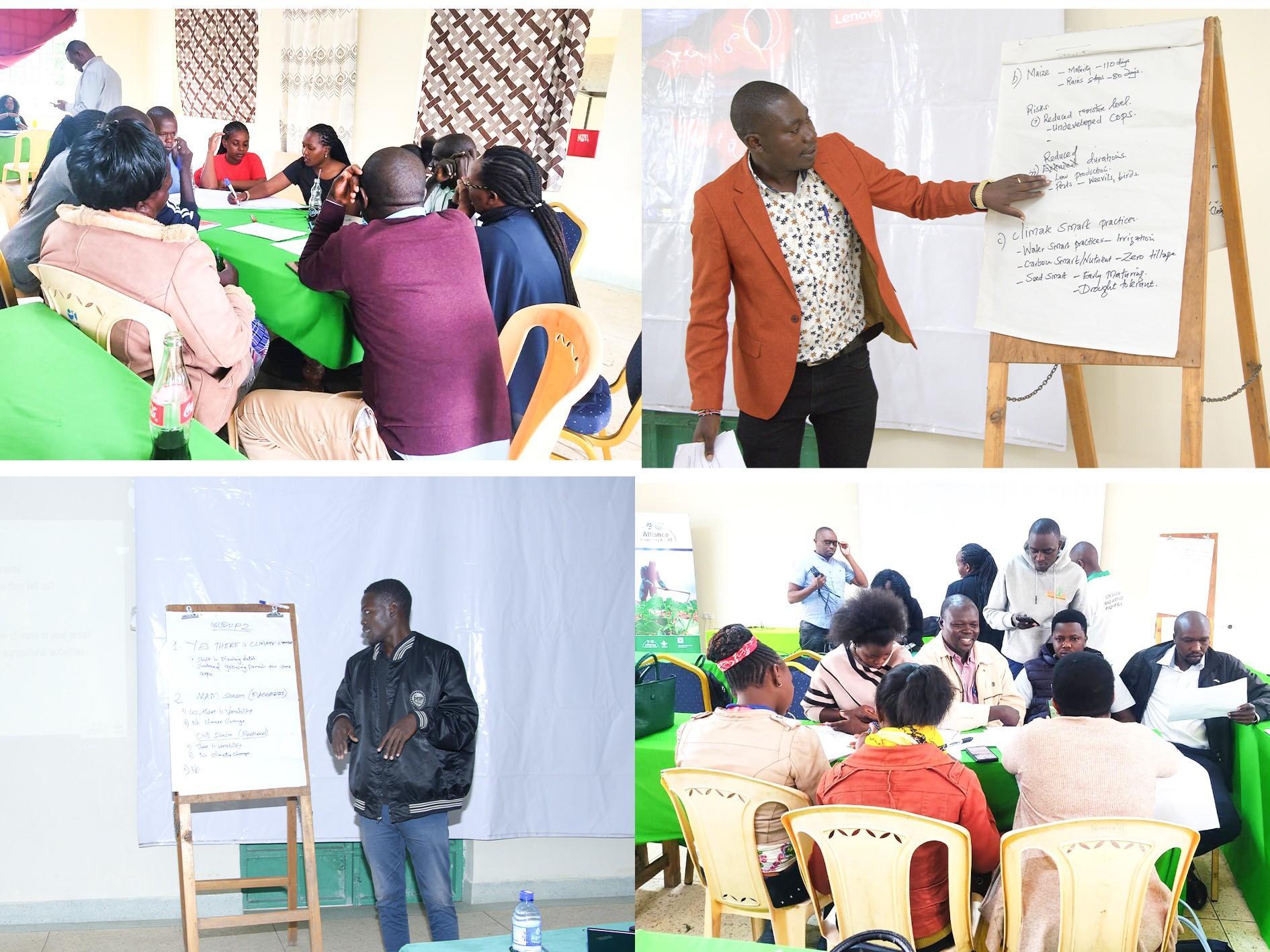
Participants drawn from Egeyo Marakwet, Nakuru, Machakos and Homabay Counties engaging in vibrant discussions at the PISCA training in Nakuru, Kenya. Photo credit: Joseline Kiogora / Alliance Bioversity International and CIAT
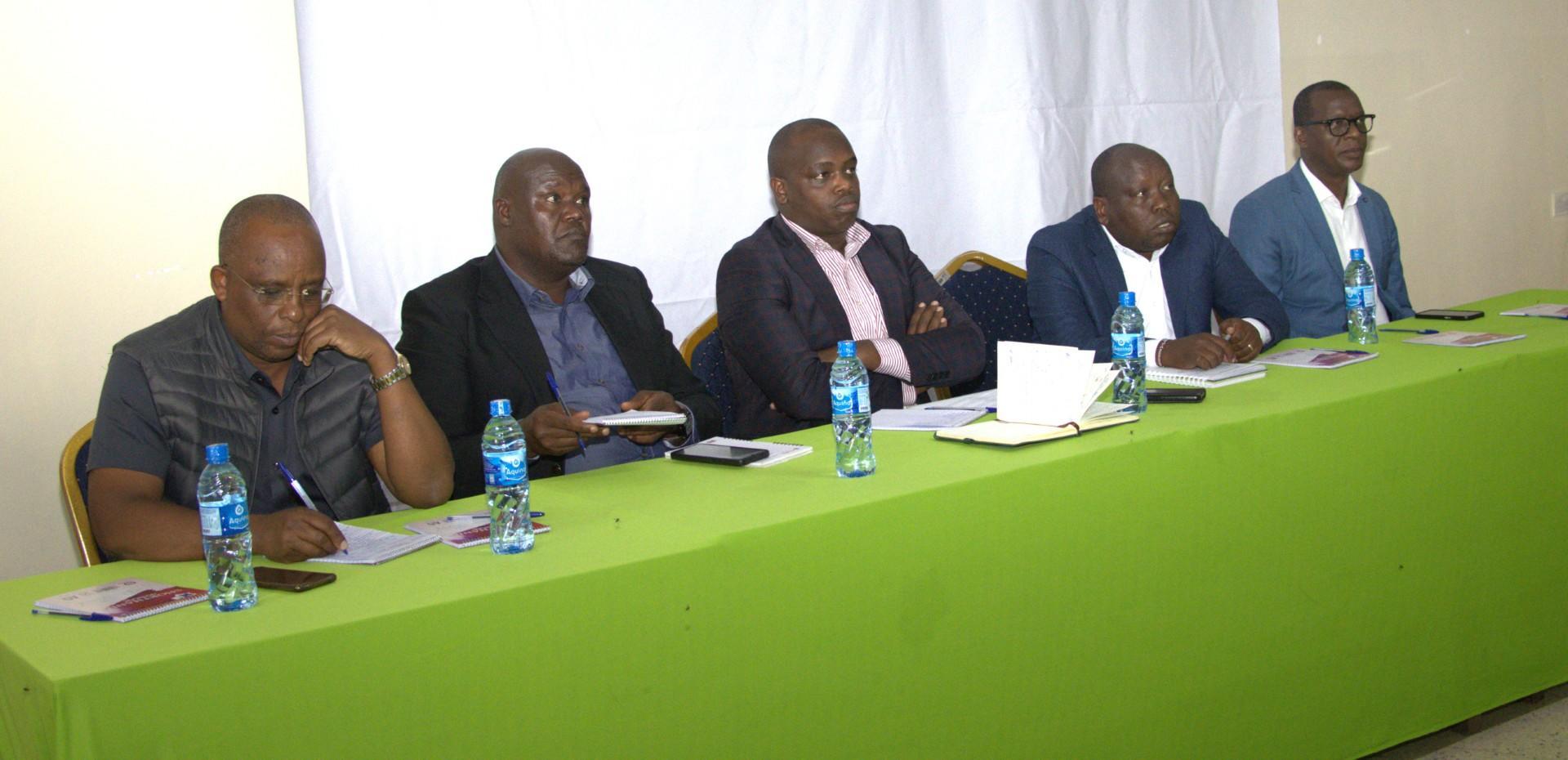
From left: Kennedy Thiong’o, Deputy Director, Technical Services at KMD; Patrick Kisiem, Director at KALRO Mkulima; Leonard Bor, the CEC for Agriculture in Nakuru County; Edwin Seroney, CEC for Agriculture in Elgeyo Marakwet; and Desire Kagabo from CIAT, come together for impactful discussions on scaling weather and climate information services to bean actors in the region.
Patrick Kesiem, the Institute Director, KALRO Katumani emphasized the importance of equipping farmers with the knowledge and tools they need to thrive in a changing climate. The Kenya Meteorology Department also played a crucial role, with the Deputy Director-Technical Services, Kennedy Thiong’o reiterating their commitment to providing accurate seasonal forecasts that inform farmers' decisions.
Supported by regional and national coordination mechanisms as well as county governments, research institutions, and governmental departments, the PICSA approach is paving the way for a more resilient and sustainable agricultural sector. Together, this partnership is empowering farmers and communities to thrive in the face of climate change.
The Team

Livingstone Byandaga
Research Specialist
Mvuyibwami Patrick
Senior Research AssociateACKNOWLEDGMENTS
The Participatory Integrated Climate Services for Agriculture (PICSA) Master Class was conducted with funding/support from the UK government's Foreign, Commonwealth and Development Office (FCDO.) and UK AID through the Met Office.
Additionally, we extend gratitude to our key partners, including the Pan-Africa Bean Research Alliance (PABRA), Kenya Agricultural and Livestock Research Organization (KALRO,) Kenya Meteorological Department (KMD), the County meteorology services and Governments of Homabay, Machakos, Nakuru and Elgeyo Marakwet, Kilifi, Kitui, Machakos, Makueni, Taita Taveta, and Tharaka Nithi and all the participating organizations and most importantly the farmers. Their collaboration and dedication played a pivotal role in the realization of this workshop and its impact, ensuring its success and lasting benefits for Kenyan farmers

